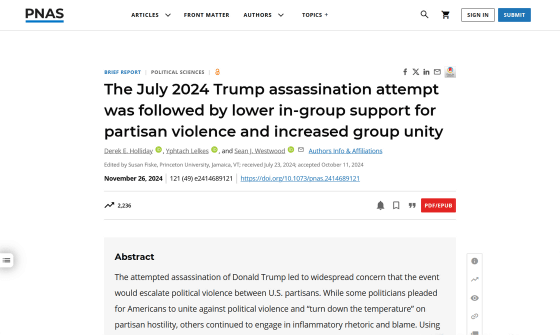Trump assassination attempt found to reduce Republican support for political violence

By
In July 2024, there was an assassination attempt on Donald Trump, who was then running for the US presidential election, in which he was shot and injured in his right ear. This incident raised concerns that 'the conflict between Republicans and Democrats who support Trump will intensify and political violence will accelerate,' but a new study found that 'the assassination attempt on Trump reduced support for violence among Republicans.'
The July 2024 Trump assassination attempt was followed by lower in-group support for partisan violence and increased group unity | PNAS
https://www.pnas.org/doi/10.1073/pnas.2414689121

Trump assassination attempt lowered Republican support for violence and boosted party unity
https://www.psypost.org/trump-assassination-attempt-lowered-republican-support-for-violence-and-boosted-party-unity/
The attempted assassination of Trump was seen as a reflection of the escalation of political conflict, and there were concerns that the conflict between Republican and Democratic supporters would deepen and eventually develop into political violence. Although there have been incidents since then, such as the arrest of a man with a gun at a golf course visited by Trump in September, as of the time of writing this article, nothing has escalated beyond that.
In this paper, a research team led by Sean Westwood, an associate professor of political science at Dartmouth College, investigated how the assassination attempt affected political violence and party loyalty among ordinary citizens. 'The media has been full of claims that Americans are on the brink of a new civil war. Shortly after the assassination attempt on Trump, commentators and many scholars argued that the United States would enter a spiral of violent escalation of partisan conflict. We wanted to test these claims with data,' Westwood said.

To study public reactions to the assassination attempt, the team used data from a large-scale national survey conducted by YouGov, a public opinion polling company. Because the survey was ongoing at the time of the Trump assassination attempt, the team was able to compare responses before and after the attempt.
The study used data from 3,572 people who responded 26 days before the assassination attempt, 703 people who responded four days after the assassination attempt, and 345 people who participated in two surveys, one before and one after the assassination attempt.
All respondents answered standard questions designed to measure political attitudes, as well as rating their favorability of Republicans or Democrats on a scale of 0 (very unfavorable) to 100 (very favorable). They were also asked whether they considered themselves a 'MAGA (Make America Great Again) Republican' (a staunch supporter of Trump), a 'Never Trumper' (a staunch opponent of Trump), or neither.
In addition, participants were asked to agree with statements that could undermine democratic principles, such as 'the number of polling stations in opposition-supporting constituencies should be reduced' and 'censorship of media critical of the party you support should be permitted,' as well as their support for political violence. Regarding support for political violence, participants were asked to express their opposition to a range of scenarios of severity, from 'unauthorized protests,' 'vandalism,' 'assault,' 'arson,' 'insane assault,' and 'murder.'

Analysis of the data revealed that 'among Republicans, support for political violence declined significantly following the assassination attempt on Trump. The decline in support for political violence was particularly pronounced among those who identified as 'MAGA Republicans.'
Republicans also did not feel more hostile toward Democrats after the assassination attempt. Instead, they felt more positive about the Republican Party, suggesting that the assassination attempt made Republicans more united.
Analyses comparing the same individuals before and after the assassination attempt also support the conclusion that the assassination attempt reduced support for partisan violence and led to an increase in party cohesion.
Among Democrats, the assassination attempt had no effect on support for political violence or feelings toward the Democratic or Republican parties. The decline in support for political violence among Republicans was temporary, and Republicans' aversion to violence faded over time.

'Our results show that Americans almost universally oppose political violence. Contrary to expectations, events like an assassination attempt do not motivate disgruntled partisans to retaliate. Instead, they further reduce what little support for violence exists in the general public. Political violence is a problem in the United States, but concerns about it may be overblown,' Westwood told PsyPost.
in Science, Posted by log1h_ik